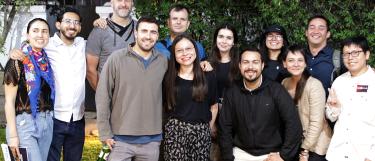
Intergenerational Meeting 2024: A Bridge Between Academia and the Challenges of the Energy Transition in Chile
On Monday, November 18, the Heidelberg Center for Latin America (HCLA) hosted a day that combined academic reflection with an intergenerational gathering of professionals, students, and graduates of the Master's in Governance of Risks and Resources (M.Sc.) at Heidelberg University in collaboration with the Pontifical Catholic University of Chile. Under the title "Territories of the Energy Transition," the event brought together experts and alumni committed to sustainability and energy change in Chile.
The day began with the Governance Lecture: Perspectives on the Energy Transition in Chile, delivered by Pablo Tello, Senior Technical Advisor for the renewable hydrogen development project in Chile at the German Society for International Cooperation (GIZ). "The challenge for Chile is the independence and decentralization of its energy matrix, involving communities," Tello emphasized. The discussion was further enriched by Dr. Rosa Lehmann, Junior Professor of Innovation and Sustainability at the Heidelberg Center for Ibero-American Studies (HCIAS) at Heidelberg University, and Dr. Johanna Höhl, a postdoctoral researcher at the same institution. Lehmann and Höhl explored the tensions and opportunities of innovation in current energy contexts and the local and global dynamics of the energy transition in Chile and the international landscape. The presentation and panel discussion captured the attention of a diverse audience, including academics, students, and energy sector experts, who engaged in a dynamic exchange of questions and dialogue with the speakers.
The event continued with a networking session in the HCLA garden, strengthening connections across generations, among alumni, and with faculty members. Rolando Núñez, a program alumnus, recalled: "When HCLA was founded, it was an unprecedented opportunity for Chilean researchers and professionals to access what was being done in Germany, with the added benefit of collaboration with Chilean universities." However, for Núñez, innovation goes beyond that: "This master's program also introduced the word 'governance' in Chile as a way to find effective solutions to real problems. Given the role Chile will play in the energy transition due to its copper and lithium reserves, it will need governance professionals to manage its resources." Rolando Núñez has been running his own renewable energy consulting firm in Japan for six years, where he currently resides.
The event, supported by the German Academic Exchange Service (DAAD), reaffirmed the Heidelberg Center for Latin America as a bridge between academia and the strategic sectors shaping Chile's future. As with other disciplines housed at HCLA, for the Governance Area, the 2024 alumni event also marks the beginning of a new phase for its network of over 350 graduates. With the launch of a process to gather suggestions from its alumni, HCLA is redesigning both its networking event program for professionals connected to Heidelberg and its intergenerational support structures. These initiatives aim to facilitate excellence in education and the successful professional integration of future program members.











